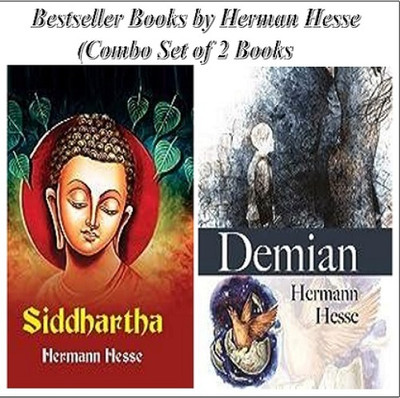Siddhartha & Demian (Combo Set Of 2 Bestseller Books)(Hardcover, Herman Hesse)
Quick Overview
Product Price Comparison
Siddhartha, novel by Hermann Hesse based on the early life of Buddha, published in German in 1922. It was inspired by the author's visit to India before World War I. Hermann Hesse's short novel Siddhartha has sometimes been called a work of reverse missionary activity, bringing to the West the lessons of a typically Eastern story of spiritual searching and fulfillment. However, this deceptively simple and episodic tale of the title character's progress through life provides no conventional resolutions to the questions it poses. In emphasizing Siddhartha's self-assertive individuality, Hesse makes plain that his book is as much a product of Western as well as Eastern intellectual traditions. Siddhartha decides to live the rest of his life in the presence of the spiritually inspirational river. Siddhartha thus reunites with the ferryman, named Vasudeva, with whom he begins a humbler way of life. Although Vasudeva is a simple man, he understands and relates that the river has many voices and significant messages to divulge to any who might listen. Herman Hesse's classic novel has delighted, inspired, and influenced generations of readers, writers, and thinkers. In this story of a wealthy Indian Brahmin who casts off a life of privilege to seek spiritual fulfillment.Demian presents the reflections of an older man on his childhood. In this book, Emil Sinclair recounts the various episodes of his childhood that led to a profound change in his Weltanschauung or worldview. Interspersed in and among these tales are SinclairŌĆÖs recollections of what he was thinking at the time in question and some analysis of why he acted as he did in any given situation. The first episode occurs when Sinclair is ten years old. Sinclair invents a story about stealing some apples and is then blackmailed by an eleven year old thug, Franz Kromer. Not having enough money to pay off Kromer, Sinclair begins to steal and is otherwise subjected to tormenting humiliation by Kromer. A slightly older, but amazingly mature boy, Max Demian, soon enters SinclairŌĆÖs school. He approaches Sinclair one day after class and presents him with an inventive interpretation of the story of Cain and Abel. This interpretation contradicts the standard Christian story Sinclair has been fed and the new idea excites Sinclair. Seemingly knowing everything, and with unbounded capability, Demian convinces Kromer to stop tormenting Sinclair. Freed from the source of his tensions, Sinclair abandons Demian and attempts to become a more model child.


